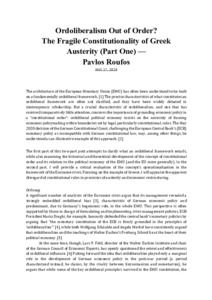Ordoliberalism Out of Order? The Fragile Constitutionality of Greek Austerity (Part One)
| dc.date.accessioned | 2024-03-25T15:36:22Z | |
| dc.date.available | 2024-03-25T15:36:22Z | |
| dc.date.issued | 2020-05 | |
| dc.identifier | doi:10.17170/kobra-202403209809 | |
| dc.identifier.uri | http://hdl.handle.net/123456789/15604 | |
| dc.description | Originally published at Legal Form. A Forum for Marxist Analysis and Critique: https://legalform.blog/2020/05/17/ordoliberalism-out-of-order-the-fragile-constitutionality-of-greek-austerity-part-one-pavlos-roufos/ | eng |
| dc.language.iso | eng | |
| dc.rights | Attribution-NonCommercial-NoDerivatives 4.0 International | * |
| dc.rights.uri | http://creativecommons.org/licenses/by-nc-nd/4.0/ | * |
| dc.subject.ddc | 320 | |
| dc.title | Ordoliberalism Out of Order? The Fragile Constitutionality of Greek Austerity (Part One) | eng |
| dc.type | Verschiedenartige Texte | |
| dcterms.abstract | The architecture of the European Monetary Union (EMU) has often been understood to be built on a fundamentally ordoliberal framework. [1] The precise characteristics of what constitutes an ordoliberal framework are often not clarified, and they have been widely debated in contemporary scholarship. But a crucial characteristic of ordoliberalism, and one that has received comparatively little attention, concerns the importance of grounding economic policy in a “constitutional order”: ordoliberal political economy insists on the necessity of framing economic policymaking within boundaries set by legal, particularly constitutional, rules. The May 2020 decision of the German Constitutional Court, challenging the European Central Bank’s (ECB) monetary policy as incompatible with German constitutional law, may, among other things, be understood as an illustrative example of this approach. The first part of this two-part post attempts to clarify what an ordoliberal framework entails, while also examining the historical and theoretical development of the concept of constitutional order and its relation to the political economy of the EMU (and the EU more generally). In the second part, I will provide a critical evaluation of the concept’s operationalization in the framework of the Eurozone crisis. Focusing on the example of Greece, I will appraise the apparent disregard of constitutional rules in processes of austerity and economic restructuring. | eng |
| dcterms.accessRights | open access | |
| dcterms.creator | Roufos, Pavlos | |
| dcterms.extent | 9 ungezählte Seiten | |
| dc.subject.swd | Griechenland | ger |
| dc.subject.swd | Eurozone | ger |
| dc.subject.swd | Sparpolitik | ger |
| dc.subject.swd | Ordoliberalismus | ger |
| dc.type.version | publishedVersion | |
| kup.iskup | false |
Dateien zu dieser Ressource
Das Dokument erscheint in:
-
Publikationen [28]


